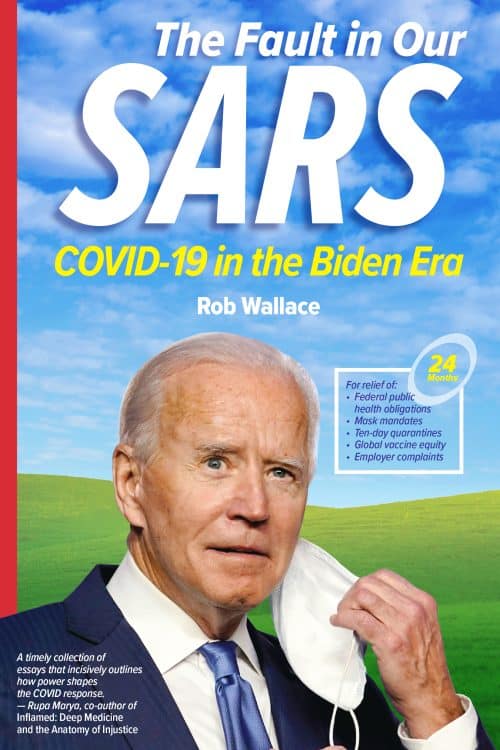The Fault in Our SARS: COVID-19 in the Biden Era
by Rob Wallace
512 pages / $26 / 978-1-58367-9937
Reviewed by Seth Sandronsky for The Progressive Populist
Rob Wallace is an evolutionary epidemiologist who writes for the layperson. His “Big farms make big flu: dispatches on infectious disease, agribusiness, and the nature of science” (Monthly Review Press 2016) is a guide to making sense of the world. To this end, he unpacks food and health, economics and politics, as a totality.
His totalizing angle is not, of course, a mainstream view of science and the society in which it operates. With the aim of making clear what is unclear in a mainstream narrative, Wallace’s book features seven parts, with five to seven dispatches each. His introduction, notes and an index enhance the dispatches. They are hard-hitting and uncompromising.
To sum up, infectious diseases flow directly from industrial farming, according to Wallace. He delivers that view on page 11, a pre-coronavirus pandemic time that seems almost quaint now. “On my beat,” Wallace writes, “evolutionary epidemiology, I came to the realization that Big Food has entered a strategic alliance with influenza, a virus that took a newly dangerous turn in an ongoing and wholly avoidable industrial accident of multinational agribusiness’s own undoing. That is, so as to leave no doubt of my contention, agribusiness, backed by state power home and abroad, is now working as much with influenza as against it.”
Wallace dispels the myth of a self-governing market for one that relies upon direct state intervention to grow market share and profit for multinational corporations, he dives into dispatch one, “The Great Bird Flu Blame Game.” It sets the stage for the subsequent dispatches. One thread is following circuits of capital investment to make sense of, for example, the hog industry and the political virology of offshore agriculture.
For example, Wallace traces the “Livestock Revolution” in the hog industry to the North American Free Trade Agreement that took effect on Jan. 1, 1994. Consequently, the NAFTA infected Mexico with the emergence of the H1N1 virus strain in 2009. That outbreak followed a sharp spike in migration north due to US taxpayer-financed imports of corn that bankrupted small farmers in Mexican states such as Chiapas.
There is much in this book about the scientific literature tied to the system’s political economy. Along the way, readers discover terms of science, ranging from clades to epizoology and phylogeography. The author also disentangles distortions of natural selection and its relevance to emerging pathogens, not the least of which is the coronavirus pandemic. Hat tip to Wallace for shining light on Darwin’s continuing importance to understanding the modern world under a social system that prioritizes the growth of wealth for a few over an equitable and sustainable life for many.
Further, Wallace discusses in detail the planetary implications in China’s transition to capitalism. The main driver of this process, according to the voluminous research he cites, is the changing relations of humans to nature, the most basic to life itself, as the climate catastrophe grows. High on the list of this damaging process is land use, a driver of our current structural crisis, Wallace writes. He cites in part István Mészáros, the Hungarian Marxist philosopher and writer, whose “Beyond Leviathan: Critique of the State” (MRP 2022), is a must-read.
You can also find Wallace online at Pandemic Research for the People. https://www.prepthepeople.net/

Comments are closed.